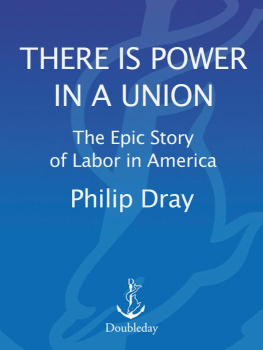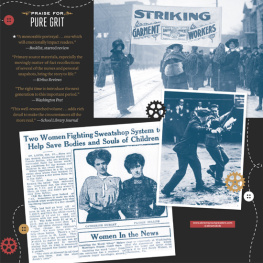CLASS ACTS
CLASS ACTS
An Anthropology of Service
Workers and Their Union
E. Paul Durrenberger
and
Suzan Erem
First published 2005 by Paradigm Publishers
Published 2016 by Routledge
2 Park Square, Milton Park, Abingdon, Oxon OX14 4RN
711 Third Avenue, New York, NY 10017, USA
Routledge is an imprint of the Taylor & Francis Group, an informa business
Copyright 2005, Taylor & Francis.
All rights reserved. No part of this book may be reprinted or reproduced or utilised in any form or by any electronic, mechanical, or other means, now known or hereafter invented, including photocopying and recording, or in any information storage or retrieval system, without permission in writing from the publishers.
Notice:
Product or corporate names may be trademarks or registered trademarks, and are used only for identification and explanation without intent to infringe.
Library of Congress Cataloging-in-Publication Data.
Durrenberger, E. Paul, 1943
Class acts: an anthropology of service workers and their union / E. Paul Durrenberger and Suzan Erem.
p. cm.
Includes bibliographical references and index.
ISBN 1-59451-082-2 (hardcover : alk. paper)
1. Service industries workersLabor unionsUnited StatesCase studies. 2. Labor unionsUnited StatesSociological aspectsCase studies. 3. Service industries workersUnited StatesCase studies. 4. Social classesUnited States. 5. Working classUnited States. I. Erem, Suzan. II. Title.
HD6515.S45D87 2005
331.88097309051dc22
2004028686
ISBN 13 : 978-1-59451-082-3 (hbk)
ISBN 13 : 978-1-59451-083-0 (pbk)
Designed and Typeset by Straight Creek Bookmakers.
To every invisible
worker in America
CONTENTS
Portions of this book have previously appeared and are used here with permission. They include works by E. Paul Durrenberger: |
1997 | Thatll Teach You: Cognition and Practice in a Union Local. Human Organization 56(4): 388392. |
2000 | Explorations of Class and Consciousness in the U.S. Journal of Anthropological Research 57(1): 4160. |
2000 | Structure, Thought, and Action: Stewards in Chicago Union Locals. American Anthropologist 104(1): 93105. |
Works by E. Paul Durrenberger and Suzan Erem: |
1997 | Getting a Raise: Organizing Workers in an Industrializing Hospital. Journal of Anthropological Research 53(1): 3146. |
1997 | The Dance of Power: Ritual and Agency among Unionized American Health Care Workers. American Anthropologist 99(3): 489495. |
1998 | The Way I See It: Perspectives on the Labor Movement from the People in It. Anthropology and Humanism 22(2): 159169. |
1999 | The Abstract, the Concrete, the Political, and the Academic: Anthropology and a Labor Union in the United States. Human Organization 58(3): 305312. |
1999 | The Weak Suffer What They Must: A Natural Experiment in Thought and Structure. American Anthropologist 101(4): 783793. |
2000 | When Anthropology Fails: Stories from the Ethnographic Front. Anthropology and Humanism 25(1): 5063. |
This is the story of what an anthropologist and a union activist learned about a big city union local. This is a book about being there. Paul was there as an anthropologist. Suzan was there as a labor activist.
Paul speaks to the folks he knows bestanthropologists whose work he reads and those whom he sees at meetings, and the students he sees every day in classes. The anthropologists have done fieldwork and they will see familiar situations of wasted time, thwarted research goals, and the search for the perfect random sample. Students want to know if anthropology has to be as boring as it often is. Paul never understood how something so exciting as the human condition could be ground into such tiresome pap by the mills of academe. Students want to know how to know things, how to find out things, and what to do about the things they find that are wrong. Paul teaches about anthropology as a way to know.
Suzan speaks to the people she knows, people in the union movement, people who devote their lives and passions to making a difference in the world thats good for people. She knows theyre busy, and they have little time to read between saving jobs, running locals, and trying to gain real power for workers. Still, there are some stories and findings in here that may offer them a jumping-off point for going forward. She also speaks to undergraduates who are taking anthropology courses. She remembers taking anthropology courses in college and being completely baffled by the fact that none of it was grounded in anything familiar. She could hear about ancestor spirits talking through shamans, or medieval Icelanders finding an infinite number of ways (and reasons) to kill each other, but she couldnt connect much but a few vague abstractions to her life in the United States. When youre done with this book, you may want to know what to do. This is a common question Pauls students ask him at the end of every semester. Paul is fond of quoting the old Wobblies, as members of the Industrial Workers of the World were known: Organize or One Big Union. OBU. Suzan has lots of answers to the questions about what to do, too. When you can think of more than one thing to do, you have to figure out which one you are going to do. Suzan warns that joining the labor movement is not for the halfhearted. Its more than just talk. Its peoples jobs and lives on the line. Its not just getting the numbers right or getting an equation to balance so its neat. Its the difference between a paycheck and no paycheckfor somebody else depending on that income to pay rent and utilities, take care of the kids, and buy food. Inquisitors know that if you torture a person, she can clam up and tell you nothing, no matter what pain they cause her. But they know their victim will more likely break and talk if it will stop them from tormenting someone else. Labor activists are often in the unenviable role of the second person, where someone else could be in danger because of their actions.
Nothing much is in the balance if an anthropologist gets something wrong. Lots more is at stake if a union activist gets something wrong. The challenge is to find ways to do things that stick, so they make the difference we want them to make, so they return power to the hands of the people.
We expect well piss off some anthropologists and some union people. We hope that students will like the book and take it to heart. If you do and you want to know what to do, then go to this website (http://www.aflcio.org/aboutunions/oi/) to learn about the AFL-CIOs Organizing Institute. Its one way you can put your education to work for the people who paid for most of it.
This book is as much about anthropology as it is about unions. Roy Rappaport (1993) advocated moving anthropology into real-world problems and putting American issues more in the center of anthropology. If theres a problem in the United States, its a problem everywhere because were all connected in the same web of economic and political relationships. He wasnt too sure about anthropologys being able to solve problems. Were not either.






